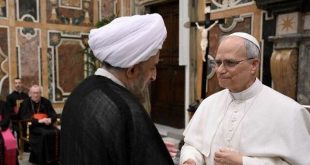In the views of Sheikh al-Azhar, the polygamy is not a principle in Islam, but rather, the goal of Islam is protecting the family.
Ijtihad Network: Since the beginning of his appointment as the Sheikh of al-Azhar until today, Ahmad al-Tayyeb, Sheikh of al-Azhar in Egypt has made many efforts for preaching moderate Islam and is known in the religious society of Egypt as a moderate scholar with modern religious concerns.
Women’s rights and issues raised related to family areamong the topics Sheikh al-Azhar emphasizes upon. During 8 years of directorship of al-Azhar, Tayyeb has always tried to take back women’s rights and achieve a new reading of rules regarding women in accordance with the needstoday.
Approving the age of marriage for girls over 18 years old, emphasis on the right of women regardingchildrencustody, condemning coercion of girls to marriage and describing it as immoral, determining monogamy as a principle in Islam to protect marital relationship are some of the actions of Sheikh of al-Azhar in protecting women’s rights.
In the views of Ahmad Tayyeb, this thought that “problems and pains eastern women suffer from are caused by Islamic teachings” is a baseless thought, and on the opposite, these pains are caused bybeing away from Islamic teachings regarding women and copying non-Islamic customs.
Having focus on the women-related issues, Sheikh of al-Azhar rejected all kinds of suppression, humiliation, oppression and aggression toward women, called for respecting their dignity and using their potentials and completely recognizing their rights as the essential partners for men in constructing the society and prosperous society.
He dedicated many of his speeches, interviews, articles and notes to the news to women, making awareness in the society for correcting wrong thoughts about them and correcting the views in the society.
Defending the rights of teenage girls and condemning marriage of immature girls was among other positive measures of al-Azhar Imam in defending women’s rights. He approved the legal view for determining the age of marriage over 18 years old and considered marriage in teenage years resulting in psychological, physical and mental harassment of girls and said, “Islam does not recognize or consider permissible a marriage which has life, moral, social or personality harm.”
From Prohibition of Polygamy to Approval of the Right of Children Custody
Ahmad al-Tayyeb also defended the right of mothers and preventing deprivation of mothers and their children from visiting each other and believed that establishing this rule in Islam and the law is for protection of physical and spiritual condition of the children. Child custody is among the mother’s rights and determining 15 years old as the age of ending the child custody is not ignoring the mother’s right and there is no conflict between the Islamic rule and determination of the end for child custody.
The polygamy crisis and increase of the number of divorces is among other topics Sheikh of al-Azhar frequently mentioned in his speeches. Al-Tayyeb expressed his worries about remissness in marriage and divorce and said, “according to field studies made about street and working children, it has been found that 90 percent of them are the victims of family disputes or children of divorce and remarriage.”
In the views of Ahmad al-Tayyeb, polygamy is not a principle in Islamic law, and rather, the essential principle in Islam is protection of the family and the living of the couple together; therefore, marrying the second wife or marrying without the knowledge of the first wife is not morally right, the same way marriage without witness or secret marriage without the permission of the girl’s guardian is not only violating morality and cultural values, but is also invalid.
One of the important measures of Ahmad al-Tayyeb in defending women was establishing a section for women-related fatwas in the department of electronic fatwas at al-Azhar. In this section, some women muftis answer the questions of women in an expert way in accordance with Islamic teachings.
Establishing educational courses in face-to-face and virtual forms, organizing meetings and conferences in schools, universities and educational centers with the aim of promoting the level of culture, ethics and awareness and making women familiar with issues of the day and urging them to have more influential roles in the society beside holding consultation classes before marriage are among other actions of Sheikh al-Azhar in supporting women.
The necessity of having more focus on the situation of women with the intention of bolstering different activities is among positive actions of al-Azhar’s Imam. Tayyeb believes that the integrity in societies is possible through granting women’s Islamic and legal rights and respecting them; and that, Islamic law too has obliged men to act upon them.
With the growth of takfiri movements in the region and recruitment of some women by terrorist factions, Ahmad al-Tayyeb, with the collaboration of Islamic-Arabic researches department of al-Azhar, organized a conference with the title of “woman and the bright perspective of progress” to show women their position in Islam and their influence in construction of an ideal society. He said, “Islam, which has always dealt with women with justice and equity, rejects any disrespectful behavior of extremists, because such behaviors have no roots in any tradition, law or religion.”
Sheikh al-Azhar believes that God created men and women as the cause of peace for each other; therefore, it is obligatory for both of them to observe good manner toward each other and respect each other’s rights. It is only then that integrity in the society can be achieved.
 Ijtihad Network Being Wise and Faithful Muslim in the Contemporary World
Ijtihad Network Being Wise and Faithful Muslim in the Contemporary World
